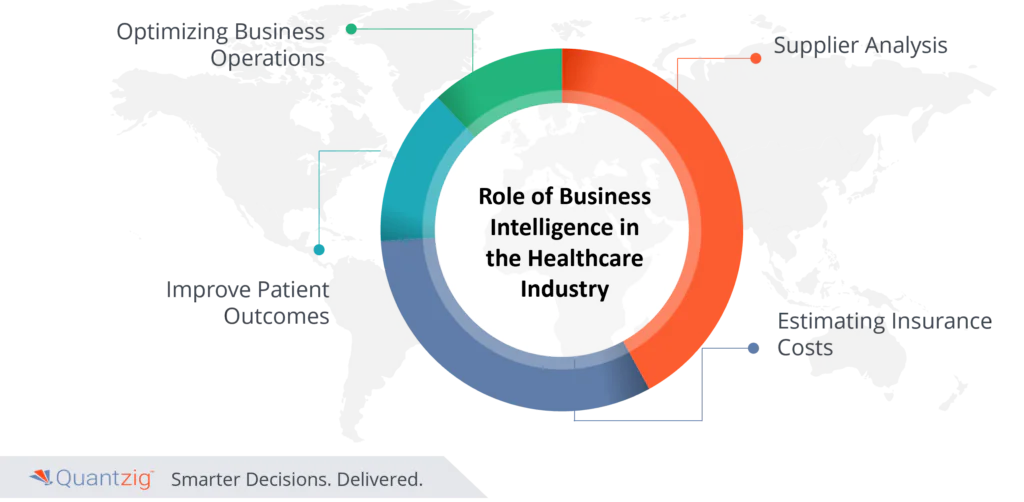As businesses increasingly rely on data to shape their strategies, business analytics solutions have become indispensable. These solutions transform raw data into meaningful insights, supporting critical decisions and helping companies navigate market complexities with precision. By deploying a comprehensive suite of solutions from predictive and prescriptive analytics solutions to cloud analytics solutions business analytics in healthcare can give providers a competitive edge, improve operational efficiency, and enhance customer engagement with healthcare business analytics tools.
This blog explores the importance of data sets in the healthcare industry and business analytics along with the wide array of tools and techniques available to businesses looking to turn data into actionable insights.
Book a demo to experience the meaningful insights we derive from data through our analytical tools and platform capabilities. Schedule a demo today!
Request a DemoTable of Contents
The Value of Business Analytics Solutions
By harnessing vast datasets, business analytics empowers organizations to identify opportunities, streamline processes, and make more informed decisions. With data analytics solutions and business intelligence solutions at their disposal, companies can:
- Make Informed, Data-Driven Decisions: Through decision-making tools such as descriptive analytics solutions, companies can assess historical trends, understand past performance, and build on this knowledge for future actions.
- Identify Opportunities and Mitigate Risks: Leveraging predictive analytics solutions, businesses can forecast trends and prepare for potential challenges. Whether it’s adjusting inventory for seasonal demand or anticipating customer preferences, insights derived from real-time analytics solutions keep organizations proactive rather than reactive.
- Enhance Operational Efficiency: Data-driven insights can optimize everything from supply chain logistics to daily operations. ETL (Extract, Transform, Load) solutions and self-service analytics allow teams to streamline data processing, improve workflows, and make swift, informed adjustments.
- Drive Customer-Centric Strategies: With customer analytics solutions, businesses can better understand customer preferences, personalize their offerings, and improve satisfaction rates, ultimately driving loyalty and revenue growth.
- Gain a Competitive Advantage: A strong analytics strategy helps companies stay ahead of the curve. By integrating big data analytics solutions and market analysis tools, they can swiftly adapt to changing market conditions, accurately assess competitor movements, and develop future-proof strategies.
Overall, businesses that invest in analytics capabilities often achieve substantial ROI by transforming insights into actionable strategies.
Essential Components of Business Analytics Solutions
Different types of analytics solutions address distinct business challenges. Here’s a breakdown of the core types within business analytics solutions:
- Descriptive Analytics Solutions: These solutions examine historical data to answer “what happened?” By tracking business performance metrics, companies gain a clear view of their past successes and failures, setting the stage for future improvements.
- Diagnostic Analytics Solutions: Going deeper, these tools help identify the root causes behind past outcomes. Diagnostic analytics is particularly valuable in analyzing why certain campaigns, products, or strategies succeeded or failed.
- Predictive Analytics Solutions: With the help of algorithms and data mining solutions, predictive analytics forecasts future trends and behaviors. These insights allow companies to prepare for upcoming demands and make proactive adjustments.
- Prescriptive Analytics Solutions: The most advanced form of analytics, prescriptive solutions suggest optimal actions to achieve desired outcomes. They answer the question, “what should we do?” using data insights, helping teams strategize and optimize for better results.
- Real-Time Analytics Solutions: These solutions are vital for businesses that need instantaneous insights. For example, e-commerce platforms can use real-time analytics to monitor user behavior and adjust recommendations on the fly, ensuring timely customer interactions.
Role of Business Intelligence in the Healthcare Industry
1. Optimizing Business Operations
Business analytics in healthcare can be utilized in a number of ways to improve various aspects of healthcare operations. For instance, hospitals can analyze patterns in emergency-room care and consequently refine their staffing strategy to determine how many ER attendants are required during different shifts. Optimizing this number will considerably save hospitals nursing costs, which is avoidable. It can also be used to improve other hospital operations including optimizing inventory, hospital equipment, and specialized care facilities.
2. Supplier Analysis
Hospitals and clinics can take a closer look at their suppliers by analyzing inventory data, EMR, and other metrics. Using such business intelligence tools, they can determine when they are overpaying the suppliers, underutilizing devices, or having wastage in their supply chain. By comparing pricing across various suppliers and analyzing their cost base, hospitals can better negotiate prices with their suppliers.
3. Improve Patient Outcomes
The healthcare business analytics industry has access to a huge amount of patient data. They can analyze patient data across patients with similar cases and analyze patterns to implement preventive care measures. They can categorize patients on the basis of the level of risk using predictive modeling to improve care quality. For instance, IBM has developed a predictive model to accurately identify patients that are at the risk of heart disease by collecting structured and unstructured data from a large pool of patients.
4. Estimating Insurance Costs
Business analytics in healthcare can help companies determine insurance costs and also predict and refine other medical expenses. For instance, medical institutions can map insurance provider data to patient data in order to create accurate models and healthcare plans.
Since most insurance companies are moving towards outcome models; hospitals are willing to work with insurance providers to promote patient outcomes by recommending efficient treatment programs. Insurance companies are willing to lower premium payments for preventive care, as it decreases the cost of overall claims for them.
How Business Analytics Drives Value Across Every Department
Organizations benefit from business analytics solutions across multiple functions, enabling cohesive strategies and impactful decisions. Let’s explore the specific advantages by department:
- Marketing: Through data visualization tools and customer analytics solutions, marketing teams can segment audiences, create targeted campaigns, and maximize ROI. These tools enable quick analysis of campaign performance and ensure that marketing strategies align with consumer trends.
- Operations: Cloud analytics solutions allow operational teams to monitor and enhance efficiency across geographies. Data analytics solutions in operations help identify bottlenecks, reduce waste, and streamline workflows, which translates to cost savings.
- Finance: Reporting solutions enable finance teams to monitor cash flow, manage risk, and make more accurate investment decisions. By leveraging business intelligence solutions, finance teams can visualize financial health in real-time, supporting proactive management.
- Product Development: Insights derived from market analysis tools and data mining solutions guide companies in refining products based on customer feedback and market demands, keeping products relevant and competitive.
- Human Resources: Self-service analytics tools empower HR teams to track employee performance, predict turnover rates, and refine hiring strategies based on data insights. This data-driven approach to HR fosters a culture of transparency and productivity.
Real-World Applications of Business Analytics
Industries from retail to healthcare are reaping the benefits of business analytics solutions. Let’s look at some examples:
- Retail: Retailers use big data analytics solutions to track purchase trends, forecast demand, and optimize inventory. Through customer analytics solutions, they can tailor promotions, ensuring customer satisfaction and loyalty.
- Healthcare: Healthcare business analytics providers leverage predictive analytics solutions to anticipate patient needs and allocate resources accordingly. From patient flow management to disease prediction, data analytics enables better outcomes and operational efficiency.
- Banking: Financial institutions use real-time analytics solutions and data visualization tools to monitor transactions, identify fraud, and enhance customer service by anticipating needs through customer analytics solutions.
Experience the advantages firsthand by testing a customized complimentary pilot designed to address your specific requirements. Pilot studies are non-committal in nature.
Request a PilotImplementing Business Analytics Solutions: A Strategic Guide
The first step is to define clear objectives by identifying specific business challenges and setting measurable goals. This clarity helps in selecting the most appropriate analytics tools and business intelligence solutions. Next, it’s crucial to invest in the right tools and skilled professionals. Organizations should consider a combination of ETL solutions, decision-making tools, and training programs that align with their unique needs. Ensuring data quality and consistency is another vital aspect; implementing robust data governance policies will help maintain the accuracy, security, and reliability of analytics outputs.
Equally important is fostering a data-driven culture within the organization. Teams should be educated on the value of data insights, and self-service analytics platforms should be promoted to encourage broader participation in data analysis. Finally, analytics initiatives should be continuously monitored, measured, and refined. Using advanced reporting solutions, organizations can track impact, gather feedback, and make necessary adjustments to drive ongoing improvement and long-term success.
How Quantzig can Help?
Quantzig empowers organizations to make data-driven decisions with tailored business analytics solutions. With a deep understanding of industry-specific challenges, Quantzig offers end-to-end data analytics solutions that transform raw data into actionable insights. Here’s how Quantzig can drive impact across various areas:
| Quantzig’s Solution Areas | Description | Benefits |
|---|---|---|
| Comprehensive Analytics Solutions | A suite of descriptive, predictive, and prescriptive analytics solutions providing full insights. | Enables organizations to understand trends, predict future outcomes, and take data-driven actions confidently. |
| Real-Time and Cloud-Based Analytics | Real-time analytics and cloud solutions for instant access to metrics and remote accessibility. | Allows businesses to respond swiftly to market changes and scales with organizational needs. |
| Data Visualization and Reporting | Custom data visualization tools and reporting solutions for clear, actionable insights. | Simplifies complex data for better understanding and faster strategic decision-making across teams. |
| Customer and Market-Focused Solutions | Customer analytics and market analysis tools to understand audience behaviors and preferences. | Enhances customer satisfaction and drives growth by enabling targeted strategies based on consumer insights. |
| Self-Service and ETL Solutions | Self-service analytics platforms and ETL solutions for independent data management. | Promotes data-driven culture by empowering teams to access and analyze data directly for quick decision-making. |
| Big Data and Advanced Analytics | Big data analytics and data mining solutions for processing large datasets and discovering insights. | Provides deeper understanding of operations, enhances operational efficiency, and reveals hidden patterns. |
Quantzig’s tailored approach ensures that every solution aligns with client goals and industry demands, empowering organizations to harness the full potential of their data for smarter, more impactful decision-making.
Get started with your complimentary trial today and delve into our platform without any obligations. Explore our wide range of customized, consumption driven analytical solutions services built across the analytical maturity levels.
Start your TrialConclusion
From data analytics solutions to advanced prescriptive analytics solutions, business analytics solutions enable companies to unlock the full potential of their data. By employing the right mix of tools descriptive analytics solutions for understanding past performance, predictive analytics solutions for future planning, and real-time analytics solutions for on-the-go insights organizations can transform data into a powerful decision-making asset.
For companies striving to thrive in competitive markets, leveraging analytics capabilities has become essential. By utilizing the right combination of business intelligence tools, market analysis techniques, and data visualization platforms, organizations can harness data to make confident decisions, enhance efficiency, and develop strategies that foster growth and resilience. Embracing a comprehensive suite of analytics approaches is a crucial step toward smarter decision-making and sustainable success, transforming data into one of a company’s most valuable assets.





